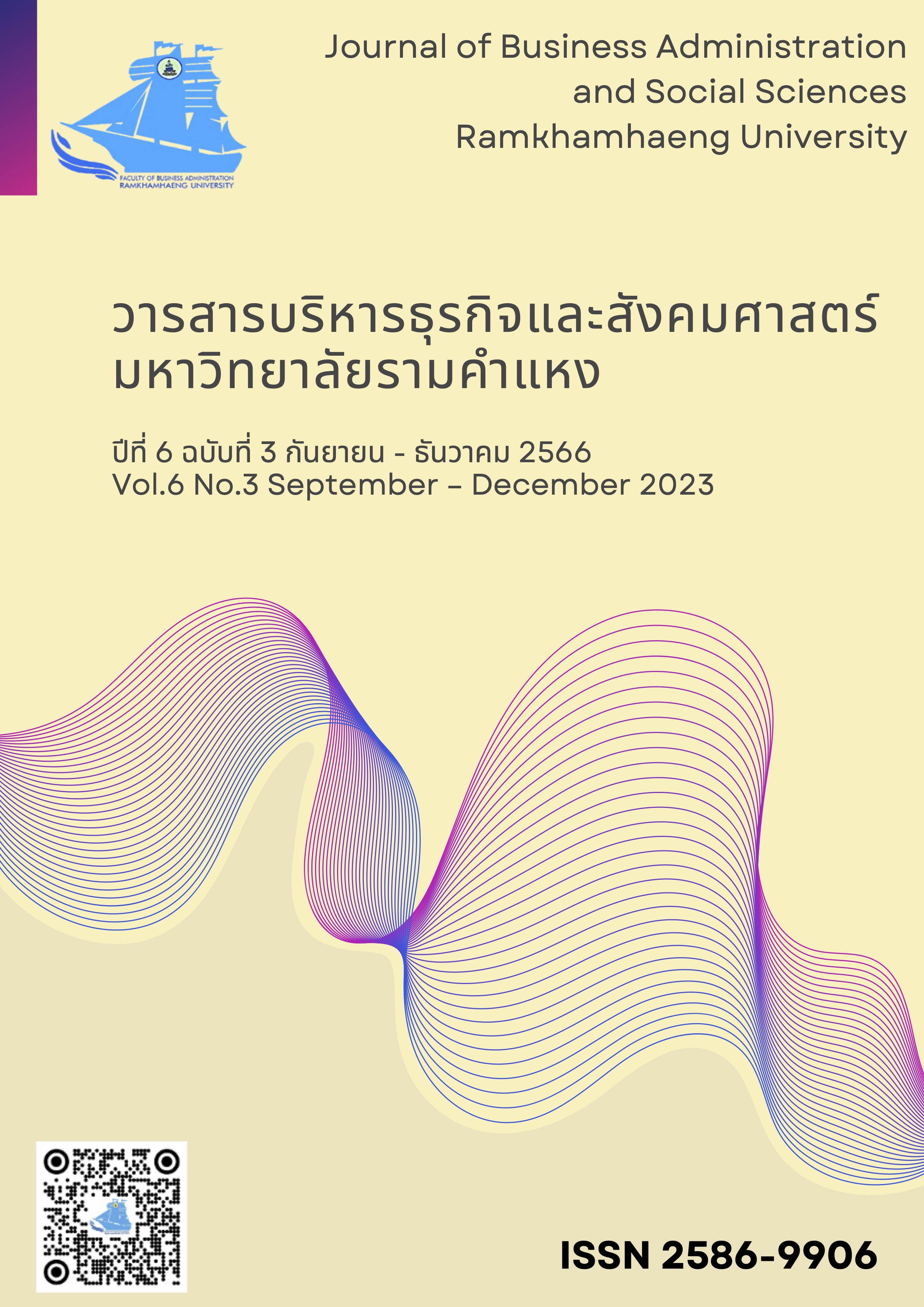Antecedents Influencing Competitiveness of Startup Entrepreneurs in Thailand
Main Article Content
Abstract
In this research investigation, the researchers examine 1) the factors influencing the competitiveness of startup entrepreneurs in Thailand; and investigate 2) the consistency of the antecedents influencing the competitiveness of the startup entrepreneurs under study with the empirical data concerning antecedents influencing competitiveness of the startup entrepreneurs under investigation.
Data were collected from 274 startup entrepreneurs using the technique of purposive sampling. The statistics for data processing consisted of percentage and frequency. The techniques of exploratory factor analysis and confirmatory factor analysis were also employed. Findings showed that five factors influencing competitiveness were the characteristics of the entrepreneurs; adaptability; knowledge sharing; innovativeness; and competitiveness. All these factors were inspected for causal influence and competitiveness. After being adjusted, the hypothesis model developed by the researchers exhibited consistency with the empirical data. In the qualitative research, the technique of in-depth interview was used on five startup entrepreneurs. Findings showed consistency with findings from the quantitative research in the following manner. 1) The characteristics of the entrepreneurs exhibited direct influence on adaptability. 2) The characteristics of the entrepreneurs exhibited direct influence on knowledge sharing. 3) Adaptability exhibited direct influence on knowledge sharing. 4) Adaptability exhibited direct influence on innovativeness. 5) Knowledge sharing exhibited direct influence on competitiveness. 6) Innovativeness exhibited direct influence on competitiveness. 7) The characteristics of the entrepreneurs did not exhibit direct influence on innovativeness. This may be due to the differences in the characteristics of each entrepreneur.
Article Details

This work is licensed under a Creative Commons Attribution-NonCommercial-NoDerivatives 4.0 International License.
เนื้อหาและข้อมูลในบทความที่ลงตีพิมพ์ในวารสารบริหารธุรกิจและสังคมศาสตร์ มหาวิทยาลัยรามคำแหง ถือเป็นข้อคิดเห็นและความรับผิดชอบของผู้เขียนบทความโดยตรง ซึ่งกองบรรณาธิการไม่จำเป็นต้องเห็นด้วย หรือร่วมรับผิดชอบใดๆ
บทความ ข้อมูล เนื้อหา รูปภาพ ฯลฯ ที่ได้รับการตีพิมพ์ในวารสารบริหารธุรกิจและสังคมศาสตร์ มหาวิทยาลัยรามคำแหง ถือเป็นลิขสิทธิ์ของวารสารบริหารธุรกิจและสังคมศาสตร์ มหาวิทยาลัยรามคำแหง หากบุคคลหรือหน่วยงานใดต้องการนำบทความทั้งหมดหรือส่วนหนึ่งส่วนใดไปเผยแพร่ต่อ หรือเพื่อกระทำการใดๆ จะต้องได้รับอนุญาตเป็นลายลักษณ์อักษรจากวารสารบริหารธุรกิจและสังคมศาสตร์ มหาวิทยาลัยรามคำแหง ก่อนเท่านั้น
References
กัลยา วานิชย์บัญชา. (2556). การวิเคราะห์สถิติ: สถิติสำหรับการบริหารและวิจัย. กรุงเทพมหานคร: โรงพิมพ์แห่งจุฬาลงกรณ์มหาวิทยาลัย.
เกศรา มัญชุศรี. (2560). SET Your Startup Business Guide. กรุงเทพมหานคร: ตลาดหลักทรัพย์แห่งประเทศไทย.
นิตยา สุภาภรณ์. (2564). ความสามารถและความได้เปรียบทางการแข่งขันของผู้ประกอบการวิสาหกิจขนาดกลางและขนาดย่อม (SMEs) ในจังหวัดนนทบุรี. วารสารวิชาการวิทยาลัยสันตพล, 7(2), 43-52.
เนตรธิดาร์ บุนนาค. (2564). Knowledge Sharing – การแบ่งปันความรู้. สืบค้นจาก https://www.sdgmove.com/2021/09/02/sdg-vocab-55-knowledge-sharing/
บุญชม ศรีสะอาด. (2542). วิธีการทางสถิติสำหรับการวิจัย (พิมพครั้งที่ 2). กรุงเทพฯ: สุวีริยา.
วิไล พึ่งผล และวิโรจน์ เจษฎาลักษณ์. (2561). คุณลักษณะความเป็นผู้ประกอบการรุ่นใหม่ที่ส่งผลต่อการดำเนินธุรกิจผ่านความได้เปรียบทางการแข่งขันของธุรกิจสตาร์ทอัพ. วารสารวิทยาลัยดุสิตธานี, 12(2), 303-318.
สำนักงานนวัตกรรมแห่งชาติ. (n.d.). สตาร์ทอัพ/สมาร์ทเอสเอ็มอี/กิจการเพื่อสังคม. สืบค้นจาก https://www.nia.or.th/segment/startup-social-enterprise.
สมชาย ภคภาสน์วิวัฒน์. (2553). การบริหารเชิงกลยุทธ์ (พิมพ์ครั้งที่ 20). กรุงเทพฯ: อมรินทร์.
สุรพล พรมกุล. (2554). ระเบียบวิธีวิจัยทางรัฐศาสตร์. กรุงเทพฯ: โอ.เอส. พริ้นติ้ง เฮาส์.
สุวิมล ติรกานันท์. (2556). ระเบียบวิธีการวิจัยทางสังคมศาสตร์: แนวทางสู่การปฎิบัติ (พิมพ์ครั้งที่ 11). กรุงเทพมหานคร: โรงพิมพ์แห่งจุฬาลงกรณ์มหาวิทยาลัย.
Adomako, S. (2018). The moderating effects of adaptive and intellectual resource capabilities on the relationship between entrepreneurial orientation and financial performance. International Journal of Innovation Management, 22(3), 1-35.
Al-Mamary, Y. H. S., & Alshallaqi, M. (2022). Impact of autonomy, innovativeness, risk-taking, proactiveness, and competitive aggressiveness on students' intention to start a new venture. Journal of Innovation & Knowledge, 7(4), 1-10.
Akgün, A. E., Keskin, H., & Byrne, J. (2012). Antecedents and contingent effects of organizational adaptive capability on firm product innovativeness. Journal of Product Innovation Management, 29(S1), 171-189.
Appel-Meulenbroek, R., Weggeman, M., & Torkkeli, M. (2018). Knowledge sharing behaviour within organisations; A diary-based study of unplanned meetings between researchers. Knowledge Management Research & Practice, 16(3), 1-13.
Ardito, L., & Petruzzelli, A. M. (2017). Breadth of external knowledge sourcing and product innovation: The moderating role of strategic human resource practices. European Management Journal, 35(2), 261–272.
Ayodele, T. O., Oladokun, T. T., & Gbadegsin, J. T. (2016). Factors influencing academic performance of real estate students in Nigeria. Property Management, 34(5), 396-414.
Calantone, R., Cavusgil, T. S., & Zhao, Y. (2002). Learning orientation, firm innovation capability, and firm performance. Industrial Marketing Management, 31(6), 515-524.
Denicolai, S., Ramirez, M., & Tidd, J. (2016). Overcoming the false dichotomy between internal R&D and external knowledge acquisition: Absorptive capacity dynamics over time. Technological Forecasting and Social Change, 104(1), 57-65.
Eshima, Y., & Anderson, B. S. (2017). Firm growth, adaptive capability, and entrepreneurial orientation. Strategic Management Journal, 38, 770-779.
Gyemang, M., & Emeagwali, O. (2020). The roles of dynamic capabilities, innovation, organizational agility and knowledge management on competitive performance in telecommunication industry. Management Science Letters, 10(7), 1533-1542.
Hana, U. (2013) Competitive advantage achievement through innovation and knowledge. Journal of Competitiveness, 5, 82-96.
Hill, C. W. L., & Jones, G. R. (1998). Strategic Management: An Integrated Approach. New York: Houghton Mifflin Company.
Hormiga, E., Saá-Pérez, P., Díaz-Díaz, N. L., Ballesteros-Rodríguez, J. L., & Aguiar-Diaz, I. (2016). The influence of entrepreneurial orientation on the performance of academic research groups: the mediating role of knowledge sharing. The Journal of Technology Transfer, 42, 10-32.
Katalyst. (n.d.). ธุรกิจสตาร์ทอัพจะเดินต่ออย่างไรหลัง COVID-19. สืบค้นจากhttps://katalyst.kasikornbank.com/th/blog/Pages/whats-next-for-startup-after-covid.html.
McKee, D. O., Varadarajan, P. R., & Pride, W. M. (1989). Strategic adaptability and Firm performance: a market contingent perspective. Journal of Marketing, 53, 21-35.
Rhee, J., Park, T., & Lee, D. H. (2010). Drivers of innovativeness and performance for innovative SMEs in South Korea: Mediation of learn in orientation. Technovation, 30(1), 65-75.
Robbins, S. P., & Coulter, M. (2016). Management (13th ed.). Harlow: Pearson Education Limited.
Shahzad, K., Zia, S. A., Syed, A. R., & Bajwa, S. U. (2013). Role of organizational vision and adaptability in knowledge Management. Problems and Perspectives in Management, 11(2), 24-34.
Tsai, K.-H., & Yang, S.-Y. (2013). Firm innovativeness and business performance: The joint moderating effects of market turbulence and competition. Industrial Marketing Management, 42(8), 1279–1294.
Tutar, H., Nart, S., & Bingöl, D. (2015). The effects of strategic orientations on innovation capabilities and market performance: The case of ASEM. Procedia-Social and Behavioral Sciences, 207, 709-719.
Yusof, N.A., & Abu-Jarad, I. Y. (2011). The Organizational Innovativeness of Public Listed Housing Developers. International Journal of Social, Behavioral, Educational, Economic, Business and Industrial Engineering, 5(2), 200-204.
Zaleśna, A. (2015). The impact of the process of adaptation and knowledge sharing on the assessment of suitability of a new employee in the company. Case studies. Torun Business Review, 14(1), 67-80.


